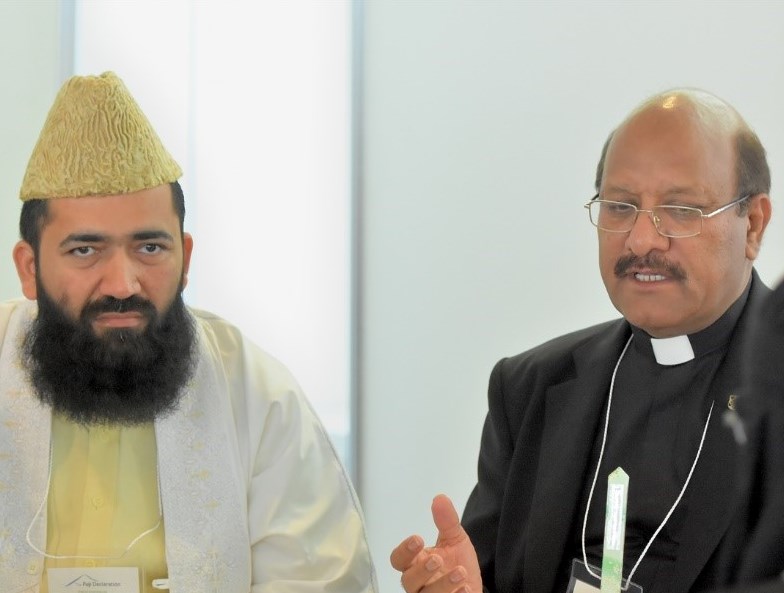|
Pakistan Church is pursuing the path of love--even in the face of violence
Friday, August 14, 2015
Father James Channan, O.P.--the former Vice Provincial of the Dominican order in Pakistan--is director of the Dominican-run Peace Center in Lahore, Pakistan, which is committed to deepening the knowledge of the faith of laity and clergy in the service of building interfaith ties with Pakistan's Muslim majority, which accounts for 96 percent of the population of 196 million; the Christian population is just 2 percent, including 2 million Catholics.
The Friar was at the UN recently to receive the "Global Ambassador of Peace Award" from the Institute of International Social Development. He spoke July 23, 2015 with international Catholic charity Aid to the Church in Need about Pakistan's Supreme Court decision to hear the appeal of Asia Bibi, a Christian woman who was sentenced to death in 2010 under the country's controversial blasphemy law.
Will Asia Bibi’s life be spared?
The Supreme Court
of Pakistan has made a great move as her death sentence was put aside. The
Supreme Court is going to review the entire case, including her death sentence.
I firmly believe that justice will be done, that she will be proven innocent and
that she will be released. The blasphemy
law was used to settle a personal score—the accusation was an act of revenge.
If she is freed, will her life be in
danger?
Yes,
unfortunately yes. Fanatics are determined to kill once someone is accused,
regardless of the legal outcome of a particular case. Bibi won’t be able to
stay in Pakistan and has to settle abroad. This of course has happened in a
number of well-known cases in the past. Our people need to be educated and come
to respect decisions of the courts of law.
How many Christians are currently in
prison accused of blasphemy?
According to
my estimate, there are 130 Christians whose trials are proceeding. But people
will be surprised to learn that there are about 950 Muslims currently held
under the law. The law is far more enacted against Muslims, and very often it
is a tool to settle business disputes or personal vendettas.
But there is
a big difference between accusations of Muslims and Christians: if one Muslim
is accused, just one Muslim is accused. But in the case of a Christian being
accused, an entire community, an entire neighborhood is accused. And in several
cases the entire Christian village or a Christian neighborhood has been burned
to ashes.
Do you have hope that Pakistan’s
anti-blasphemy law will ever be repealed?
That will
not happen. It is a very delicate and sensitive matter; extremist groups are
very attached to it. But certain safeguards can be put in place. The misuse of
the law should be stopped, such as its use to settle personal scores or to
further business purposes. Those who bring false accusations should be
punished—and this idea is also being supported by a growing number of Muslims,
including some top leaders.

What is your most important mission
in Pakistan today?
To promote
peace, build trust and mutual respect between Christians and Muslims. The goal
is equal rights for all citizens—and we are making some progress. For example,
several key Muslim religious leaders and scholars have become part and parcel
of Christian-Muslim dialogue. These include two prominent Muslim religious
leaders in Lahore: Hafiz Tahir Mehmood Ashrafi, chairman of the Pakistan Ulama
Council—which oversees 60,000 mosques and 10,000 Madrasa schools throughout the
country; and Maulana Abdul Khabir Azad, Grand Imam of the fifth largest mosque
in the world, the Badshahi Mosque in Lahore. These men also support the
punishment of those who bring false accusations under the anti-blasphemy law.
Our joint
efforts are bearing forth much fruit—it is a path of love—but we need to do
much more and enhance our dialogue activities throughout Pakistan. Without
dialogue there is no future of the Church in Pakistan.
Do you believe then in a moderate
Islam?
Yes, I do. Pakistan
is an Islamic state, but the rights of all minorities should be respected. We
have to work toward that—Christians alongside Muslims. The government could
also do a lot more in terms of revising the Constitution and striking those
provisions that relegate Christians—and other religious minorities, such
Hindus, Sikhs, Zoroastrians and Baha’i—to second-class citizen status.
Government should use the media to change the people’s mindset—to promote
tolerance.
Today,
however, Christians live in a state of fear because of all the recent violence.
And they have no option of emigrating anywhere! Therefore, we need to somehow find
a way to work with the Muslim majority—hence, building bridges between the communities
is of vital importance, however long it takes. And Pakistan’s Catholic Church
is on the forefront of this process.
What about the freedom of a Muslim to
convert to Christianity?
It is a very
sensitive issue. A Muslim who converts to the Christian faith comes under
enormous social pressure. Conversions
are dangerous if they are publicly known—the convert’s life is in danger and so
is the life of the priest who oversees the conversion, for example.
Maulana Abdul Khabir Azad and Fr James Channan OP; photo courtesy of Father Channan
|